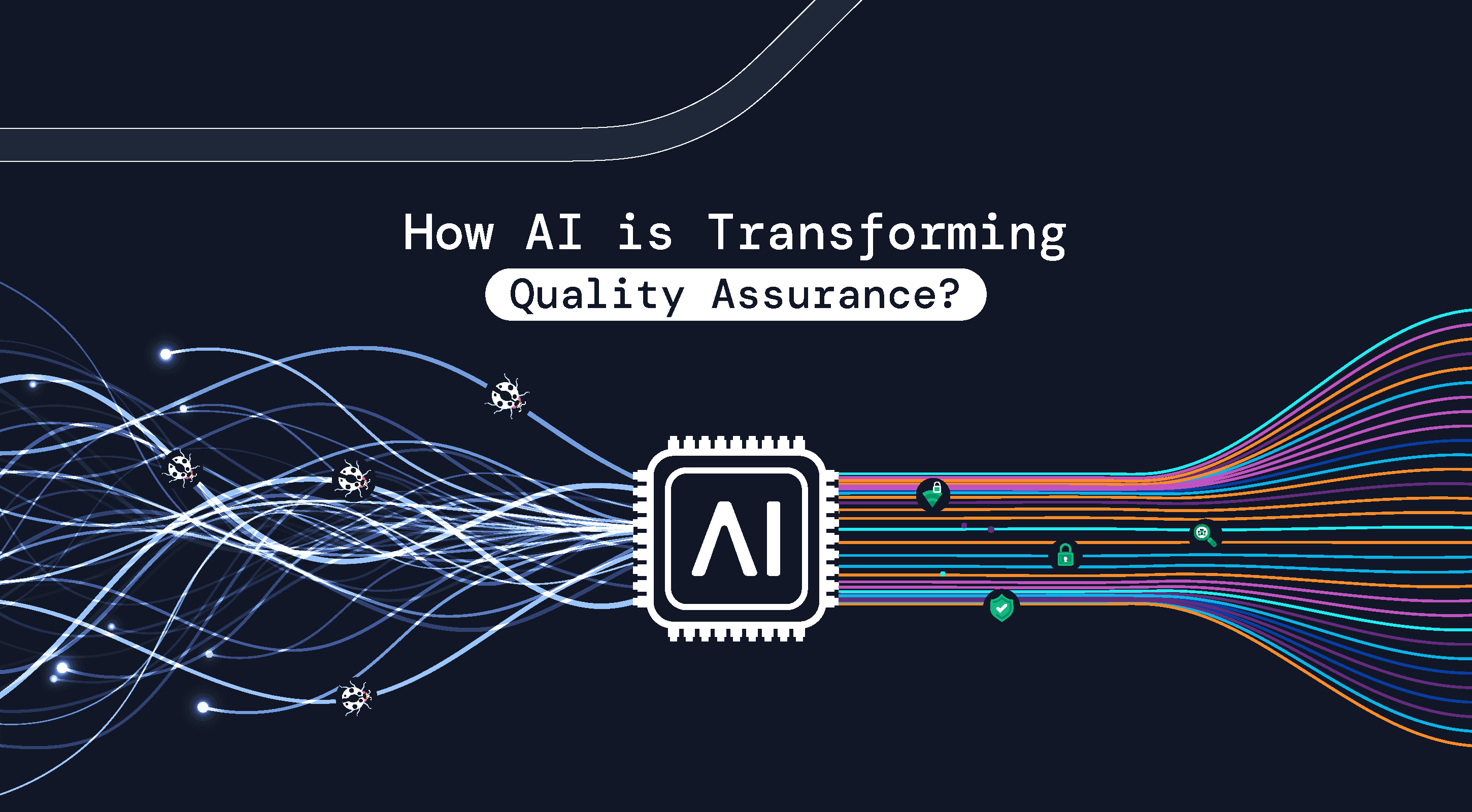Is Quality Assurance (QA) and Testing Still Needed in the Age of Artificial Intelligence (AI)?
Learn how AI reshapes software testing by simplifying processes, explore the opportunities it brings, and what the future holds for QA in an AI-driven world.

Ayyamuthu Archunan
Test Automation Architect

Technology is advancing rapidly, driven by the rise of Artificial Intelligence (AI). Through task automation, enhanced decision-making, and new opportunities, AI is transforming industries worldwide. Yet even as AI reshapes the technological landscape, Quality Assurance (QA) and testing remain essential components of software development.
This blog explores why software testing continue to be crucial in the AI era, examines the role of artificial intelligence in quality assurance, and looks at the evolving role of testing professionals.
What is Software Testing?
Software testing is the process of evaluating and verifying that a software application or system behaves as expected. Its primary goal is to ensure that the software meets the specified requirements, functions correctly, and is free of bugs or defects that could disrupt the user experience.
Software Testing is Context-Driven
Software testing requires a context-driven approach and there’s no universal solution. The testing strategy must align with the software type, its operating environment, and organisational objectives.
For instance:
A mobile app need extensive testing across devices and usability scenarios compared to a desktop application.
An e-commerce website might prioritize load testing to handle sudden traffic surges during peak sales periods.
A critical system used in aerospace or healthcare needs rigorous security and safety testing to eliminate any possibility of error.
As AI-powered systems grow more sophisticated, context-driven testing becomes increasingly vital. Each AI model requires its own testing approach, tailored to its specific application.
AI in Quality Assurance: How AI Can Be Used in Software Testing for Better Results
AI can be an incredibly powerful ally in software testing. Here’s how AI can help improve the testing process:
Automating Repetitive Tasks
Software testing, particularly functional testing, involves many repetitive and time-consuming tasks. AI automates these processes, cutting down manual effort and time.
Automated Test Script Generation: AI creates test scripts by analyzing application code and user interfaces. Tools like Testim.io and Selenium with AI-enhanced capabilities generate scripts automatically based on user interactions and code changes, making test case creation more efficient.
Regression Testing: Regression testing traditionally demands significant time. AI tools pinpoint which application areas are most impacted by recent changes and execute only necessary tests, streamlining the process.
Intelligent Test Selection and Execution
AI can help QA teams intelligently choose which tests to run and when to execute them, improving both efficiency and test coverage.
Risk-Based Testing: AI can predict which areas of the application are more likely to contain defects based on historical data, past failures, and usage patterns. This allows QA teams to prioritize high-risk areas for testing, ensuring that the most critical parts of the application are thoroughly checked.
Dynamic Test Execution: AI can select and execute tests based on the changes made in the code. If there’s a small update in one module, AI can ensure that only relevant test cases are executed. This reduces the time spent on unnecessary tests.
Self-Healing Tests
AI can make tests more resilient by enabling them to adapt to changes in the application. When a UI element changes (like a button label or position), AI-powered test tools can automatically identify the change and update the test scripts accordingly.
Self-Healing Test Scripts: Tools like TestCraft use AI to detect changes in the user interface and automatically fix the test scripts without human intervention. This reduces the time spent maintaining test scripts, especially in rapidly evolving applications.
Natural Language Processing (NLP) for Test Case Creation
AI can assist in creating test cases from natural language descriptions, which can be extremely helpful for non-technical stakeholders or business analysts who may not be familiar with coding.
AI-Powered Test Case Generation: Tools like Katalon Studio and Test.ai use AI and NLP to transform requirements written in plain English into executable test cases. This helps ensure that the tests align with business requirements, even if they were written by non-technical team members.
Improved Test Coverage: By converting natural language requirements into test cases, AI helps ensure that testing is comprehensive and aligned with user expectations, reducing the likelihood of missing important scenarios.
Performance and Load Testing with AI
Performance testing is essential to ensure that an application can handle traffic spikes and function smoothly under stress. AI can enhance this process by predicting performance bottlenecks and optimizing load testing strategies.
Predictive Load Testing: AI can analyze historical performance data to predict how the system will behave under different traffic loads. It can simulate various user behaviors, providing more realistic and targeted performance tests. This can help prevent performance issues before they arise.
Root Cause Analysis: When performance issues are detected, AI can help identify the root cause by analyzing large volumes of data, such as server logs and resource usage. This allows QA teams to pinpoint specific areas that need optimization.
Bug Detection and Prediction
AI can improve bug detection by analyzing vast amounts of data and identifying issues that might not be easily spotted by human testers.
Intelligent Bug Detection: AI-powered tools can scan code for potential bugs or vulnerabilities using techniques such as static code analysis or dynamic analysis. These tools can identify patterns in the code that typically lead to bugs or security vulnerabilities, alerting QA teams to fix them before they affect the user experience.
Predictive Bug Tracking: By analyzing past test results, AI can predict where new bugs are most likely to occur based on patterns in the code and past failures. This predictive capability helps QA teams focus on areas of the application that are prone to issues, improving the overall testing strategy.
AI for User Interface (UI) Testing
UI testing is critical for ensuring that the user interface of the application is intuitive, responsive, and bug-free. AI can help improve the efficiency of UI testing by analyzing visual elements and detecting issues more effectively.
Visual Regression Testing: AI can perform visual regression testing by comparing screenshots of the UI before and after changes. AI-powered tools can identify subtle UI issues like pixel differences, layout problems, or color discrepancies, which might be difficult for human testers to spot.
Usability Testing with AI: AI can also analyze user interactions with the application to detect usability issues. By using AI-driven tools, you can simulate how users navigate the application and identify friction points, improving the overall user experience.
AI for Test Analytics and Reporting
AI can provide in-depth insights into the testing process by analyzing test results and identifying areas for improvement. This can help QA teams optimize their testing efforts and make data-driven decisions.
Automated Test Reporting: AI can generate detailed reports on test results, highlighting areas of concern, trends, and areas that need attention. AI-powered tools can also suggest improvements to test strategies based on past performance data.
Analysing Test Efficiency: By analysing historical testing data, AI can identify which tests are the most effective and which are redundant. This helps QA teams optimize their test suites and remove unnecessary tests, leading to faster test execution times.
AI in Continuous Testing and DevOps
As software development becomes more agile and DevOps-centric, QA teams are increasingly adopting continuous testing practices. AI can be a key enabler of continuous testing in these environments.
Continuous Test Automation: AI-driven test automation tools can integrate seamlessly into the CI/CD pipeline, automatically running tests whenever code changes are pushed to the repository. This ensures that the application is always tested and validated, even in fast-paced development cycles.
Faster Feedback for Developers: AI allows QA teams to provide faster feedback to developers by automatically running tests, detecting bugs early, and providing actionable insights. This helps improve collaboration between developers and testers and ensures that issues are addressed before they reach production.
How AI Makes Software Testing Easier
AI streamlines software testing by improving efficiency and enabling greater scalability:
Faster Feedback Loops: AI powers continuous testing and provides rapid feedback throughout development, enabling teams to identify and resolve bugs earlier.
Smarter Test Execution: AI intelligently prioritizes tests according to risk level and importance, ensuring critical tests receive immediate attention.
Self-Healing Tests: AI automatically updates and fixes broken tests as applications evolve, minimizing maintenance work and ensuring tests remain current.
AI and the Future of Software Testing Jobs
While AI is transforming software testing, it won't eliminate testing jobs. Rather, AI will reshape these roles and create new opportunities:
AI-Test Specialist Roles: The growing integration of AI into testing will create demand for specialists who can expertly configure and optimize AI-driven testing tools.
Data Scientists for Testing: Since AI-powered testing relies heavily on data, data scientists will be essential for analyzing and preparing test datasets.
Higher-Level Roles: As AI handles routine tasks, testers can focus on strategic aspects like test planning, exploratory testing, and complex problem-solving.
AI Ethics and Bias: Testing AI systems demands expertise in evaluating fairness, security, and ethical implications, creating new roles focused on AI testing ethics.
Final Words: The future of QA?
AI is a valuable tool that can improve the QA process by automating repetitive tasks, analyzing data, and detecting patterns. However, human qualities like creativity, intuition, judgment, empathy, and accountability cannot be replaced by AI. The best software testing outcomes will always come from combining AI tools with human expertise.
In short, while AI can assist with testing, humans will remain the ultimate decision-makers in QA.



